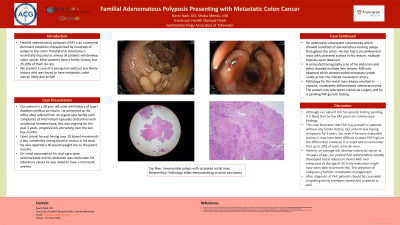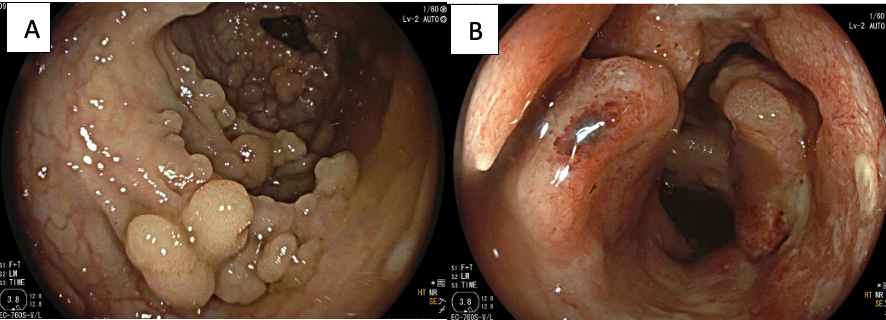Tuesday Poster Session
Category: Colon
P3750 - Familial Adenomatous Polyposis Presenting With Metastatic Colon Cancer
Tuesday, October 29, 2024
10:30 AM - 4:00 PM ET
Location: Exhibit Hall E

Has Audio

Navin Naik, DO
Franciscan Health Olympia Fields
Tinley Park, IL
Presenting Author(s)
Navin Naik, DO1, Shoba Mendu, MD2
1Franciscan Health Olympia Fields, Tinley Park, IL; 2Gastroenterology Associates, Chesapeake, VA
Introduction: Familial adenomatous polyposis (FAP) is an autosomal dominant condition characterized by hundreds of polyps in the colon. Prophylactic colectomy is essentially required as almost all patients will develop colon cancer. Most patients have a family history, but 25-30% of them do not. We present a case of a young man without any family history who was found to have metastatic colon cancer, likely due to FAP.
Case Description/Methods: Our patient is a 28 year old male with history of type I diabetes mellitus on insulin. He presented to the office after referral from an urgent care facility with complaints of intermittent episodes of diarrhea with occasional hematochezia; this was ongoing for the past 3 years, progressively worsening over the last few months. Upon arrival he was having over 10 bowel movements a day, sometimes noting blood or mucus in his stool. He also reported a 30 pound weight loss in the past 6 months. On initial examination his vital signs were unremarkable and his abdomen was nontender. On laboratory values he was noted to have a microcytic anemia. He underwent subsequent colonoscopy which showed hundreds of adenomatous-looking polyps throughout the colon (Image A). He also had a circumferential mass with ulcerated surface in his rectum; multiple biopsies were obtained (Image B). A computed tomography scan of his abdomen and pelvis showed multiple liver lesions. MRI was obtained which demonstrated metastatic lymph nodes across the inferior mesenteric artery. Pathology for the rectal mass biopsy resulted in invasive, moderately differentiated adenocarcinoma (1C). The patient was referred to colorectal surgery and he is pending FAP genetic testing.
Discussion: Although our patient still has genetic testing pending, it is likely that he has FAP given his colonoscopy findings. This case illustrates that FAP may present in patients without any family history. Our patient was having symptoms for 3 years, but even if he were evaluated sooner, it may have been difficult to place FAP high on the differential; however, it is important to remember that up to 30% of cases arise de novo. Patients on average will develop colorectal cancer at 39 years of age; our patient had unfortunately already developed rectal adenocarcinoma with liver metastasis at the age of 28. Early evaluation might have been able to prevent this. The presence of malignancy further complicates management. After diagnosis of FAP, patients should be counseled on getting family members tested and screened as well.

Disclosures:
Navin Naik, DO1, Shoba Mendu, MD2. P3750 - Familial Adenomatous Polyposis Presenting With Metastatic Colon Cancer, ACG 2024 Annual Scientific Meeting Abstracts. Philadelphia, PA: American College of Gastroenterology.
1Franciscan Health Olympia Fields, Tinley Park, IL; 2Gastroenterology Associates, Chesapeake, VA
Introduction: Familial adenomatous polyposis (FAP) is an autosomal dominant condition characterized by hundreds of polyps in the colon. Prophylactic colectomy is essentially required as almost all patients will develop colon cancer. Most patients have a family history, but 25-30% of them do not. We present a case of a young man without any family history who was found to have metastatic colon cancer, likely due to FAP.
Case Description/Methods: Our patient is a 28 year old male with history of type I diabetes mellitus on insulin. He presented to the office after referral from an urgent care facility with complaints of intermittent episodes of diarrhea with occasional hematochezia; this was ongoing for the past 3 years, progressively worsening over the last few months. Upon arrival he was having over 10 bowel movements a day, sometimes noting blood or mucus in his stool. He also reported a 30 pound weight loss in the past 6 months. On initial examination his vital signs were unremarkable and his abdomen was nontender. On laboratory values he was noted to have a microcytic anemia. He underwent subsequent colonoscopy which showed hundreds of adenomatous-looking polyps throughout the colon (Image A). He also had a circumferential mass with ulcerated surface in his rectum; multiple biopsies were obtained (Image B). A computed tomography scan of his abdomen and pelvis showed multiple liver lesions. MRI was obtained which demonstrated metastatic lymph nodes across the inferior mesenteric artery. Pathology for the rectal mass biopsy resulted in invasive, moderately differentiated adenocarcinoma (1C). The patient was referred to colorectal surgery and he is pending FAP genetic testing.
Discussion: Although our patient still has genetic testing pending, it is likely that he has FAP given his colonoscopy findings. This case illustrates that FAP may present in patients without any family history. Our patient was having symptoms for 3 years, but even if he were evaluated sooner, it may have been difficult to place FAP high on the differential; however, it is important to remember that up to 30% of cases arise de novo. Patients on average will develop colorectal cancer at 39 years of age; our patient had unfortunately already developed rectal adenocarcinoma with liver metastasis at the age of 28. Early evaluation might have been able to prevent this. The presence of malignancy further complicates management. After diagnosis of FAP, patients should be counseled on getting family members tested and screened as well.

Figure: Image A: Innumerable polyps in large intestine
Image B: Rectal mass
Image B: Rectal mass
Disclosures:
Navin Naik indicated no relevant financial relationships.
Shoba Mendu indicated no relevant financial relationships.
Navin Naik, DO1, Shoba Mendu, MD2. P3750 - Familial Adenomatous Polyposis Presenting With Metastatic Colon Cancer, ACG 2024 Annual Scientific Meeting Abstracts. Philadelphia, PA: American College of Gastroenterology.
